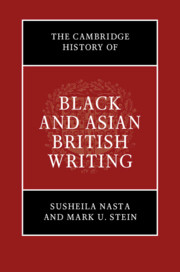Book contents
- The Cambridge History of Black and Asian British Writing
- The Cambridge History of Black and Asian British Writing
- Copyright page
- Dedication
- Contents
- Notes on Contributors
- Preface and Acknowledgements
- Introduction
- Part I New Formations
- Part II Uneven Histories
- (I) Global Locals
- (II) Disappointed Citizens
- (III) Here to Stay
- 19 Sonic Solidarities
- 20 Vernacular Voices
- 21 Narratives of Survival
- 22 Black and Asian British Theatre Taking the Stage
- 23 The Writer and the Critic
- 24 Forging Connections
- 25 Reading the ‘Black’ in the ‘Union Jack’
- Part III Writing the Contemporary
- Select Bibliography
- Index
25 - Reading the ‘Black’ in the ‘Union Jack’
Institutionalising Black and Asian British Writing
from (III) - Here to Stay
Published online by Cambridge University Press: 19 December 2019
- The Cambridge History of Black and Asian British Writing
- The Cambridge History of Black and Asian British Writing
- Copyright page
- Dedication
- Contents
- Notes on Contributors
- Preface and Acknowledgements
- Introduction
- Part I New Formations
- Part II Uneven Histories
- (I) Global Locals
- (II) Disappointed Citizens
- (III) Here to Stay
- 19 Sonic Solidarities
- 20 Vernacular Voices
- 21 Narratives of Survival
- 22 Black and Asian British Theatre Taking the Stage
- 23 The Writer and the Critic
- 24 Forging Connections
- 25 Reading the ‘Black’ in the ‘Union Jack’
- Part III Writing the Contemporary
- Select Bibliography
- Index
Summary
This chapter explores the emergence of black and Asian British writing as it began to become institutionalised: in school curricula, universities and higher education, as well as on the lists of educational and mainstream publishing houses. Examining the material conditions impacting on the recognition of this writing across Britain’s arts and educational cultures, it focuses on the second half of the twentieth century, especially the turbulent political period from the late 1970s onwards, to the present day. Though evidence of this history remains uneven, it is important to view the institutionalisation alongside specific political, cultural, and material contexts, in particular the policies of anti-racism, multiculturalism, and cultural diversity as well as government-driven enquiries like the crucial investigation into structural racial inequalities following the Stephen Lawrence murder in the 1999 Macpherson Report. Examining the political and educational initiatives behind arts funding, the chapter highlights how the growing interest in postcolonial studies since the 1990s has also created a wider market for black and Asian British writing, both for publishers and on university courses.
- Type
- Chapter
- Information
- The Cambridge History of Black and Asian British Writing , pp. 417 - 432Publisher: Cambridge University PressPrint publication year: 2020

